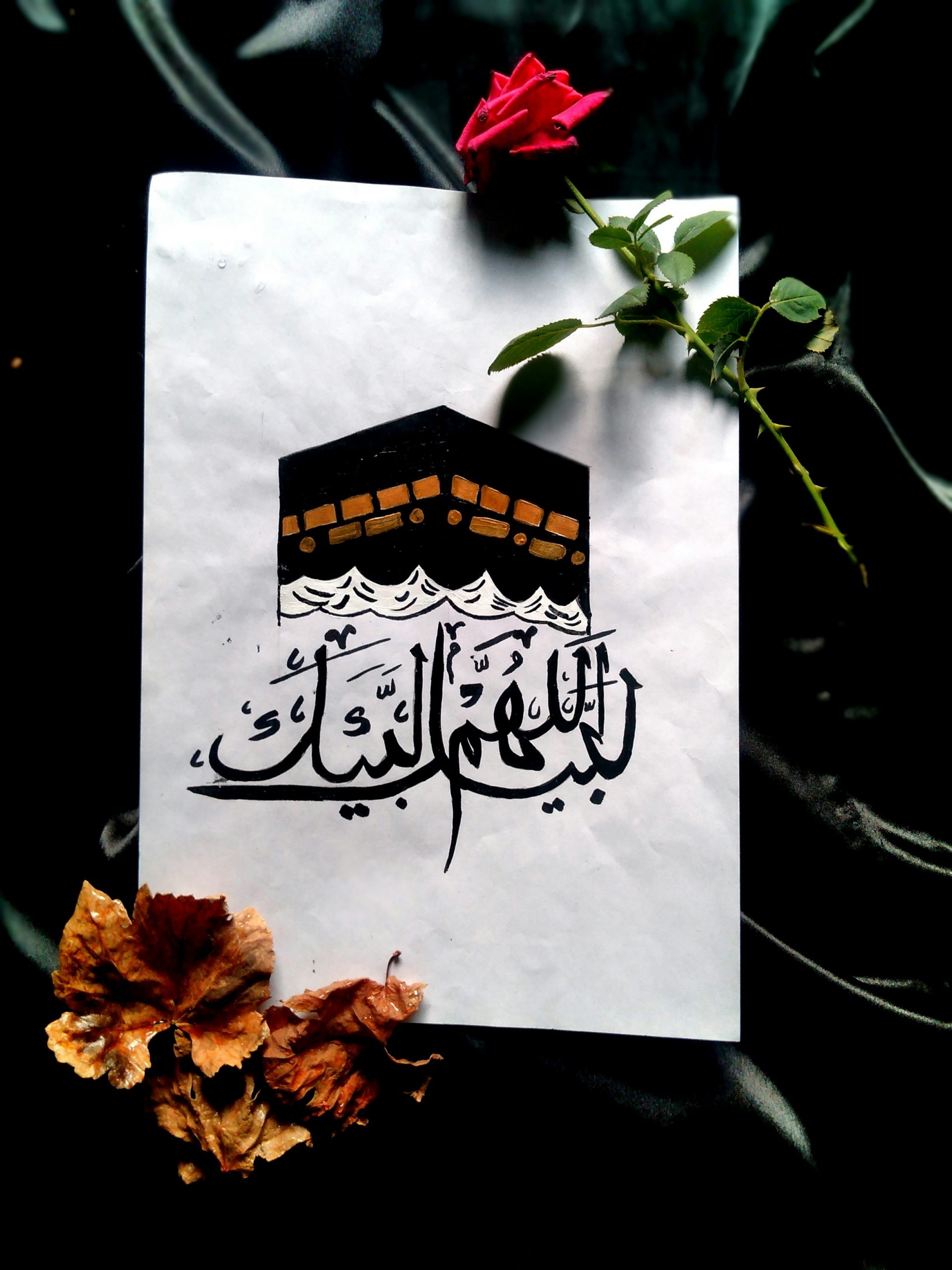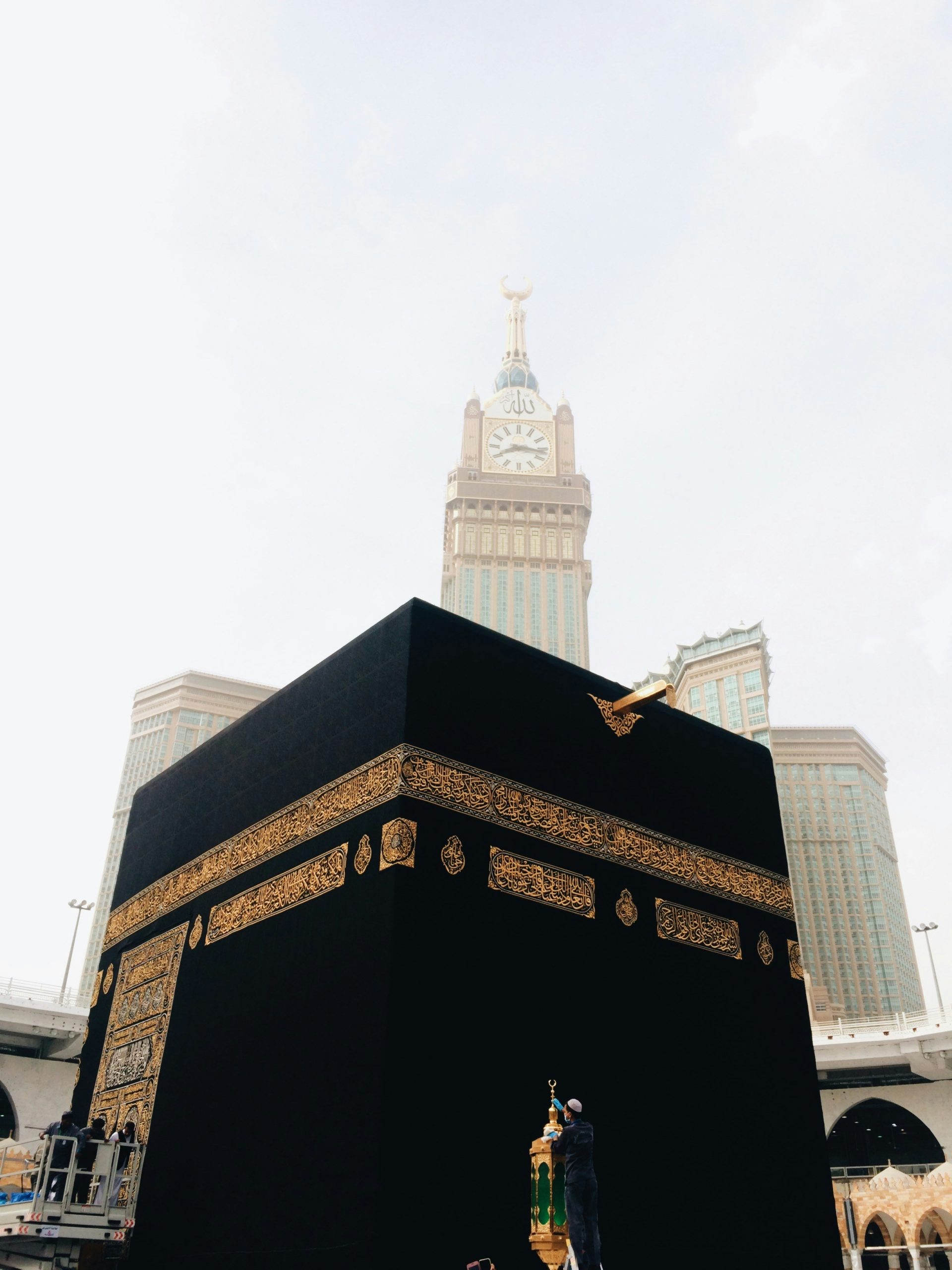#Islam
The Invitation: A Decade Of Longing
Published

It’s been ten years.
Ten years since you heard the adhan reverberating through the crowded streets, ten years since your feet felt the hardness of the marble floors, ten years since you laid your eyes on the Kaabah.
In those ten years, your father’s beard turns white. Your siblings graduate from high school, then university, find jobs, get married, have kids.
Keep supporting MuslimMatters for the sake of Allah
Alhamdulillah, we're at over 850 supporters. Help us get to 900 supporters this month. All it takes is a small gift from a reader like you to keep us going, for just $2 / month.
The Prophet (SAW) has taught us the best of deeds are those that done consistently, even if they are small. Click here to support MuslimMatters with a monthly donation of $2 per month. Set it and collect blessings from Allah (swt) for the khayr you're supporting without thinking about it.
You become a mother yourself, once, then twice, and now you have two boys, five and eight, you celebrate your fourteenth wedding anniversary, your business is growing, and look – look what these ten years have made of you. You’ve gone through difficulties you never thought you could get out of, trials you endured when everything changed, the debris of those explosions scattered across the years. Somehow, Allah 
He molds you into the person you’ve always wanted to be.
After ten years, you are content, at home in yourself, and only then, Allah 
To His home.
***
In the weeks before you depart, whenever you start to think, I’m going for Umrah, there’s a lump that forms in your throat and no sooner is it there that you swallow it. Not yet, you tell yourself. It’s not true until it’s real.
You have done everything, crossed off all the tasks on your to-do list – book flights, book hotels, apply for visas, download the Nusuk app, book Umrah and Rawdah times. But you still don’t believe it. “I’m going for Umrah,” you tell your friends and you feel nothing, not even a flutter of excitement in your chest, even as you admit to them that you can’t wait.
And then the day comes when you are finally leaving and all your energy is laser-focused on the last-minute tasks – packing the kids’ suitcase for their stayover at your in-laws, making sure they have enough underwear and socks to last them the week, their snow pants, hats, gloves, mittens, neck warmers for when they go out and in case it snows, and don’t forget their health cards and medication in case they fall sick.
You are mostly packed but you fuss and fidget, wondering if you are taking too much, too little, not enough of something, and you check and recheck your bags, and as the hours slip by and you make wudu, change into your travel clothes, pray asr, and walk out of your home, still you will not let yourself believe that you are going.
It is staring you in the face, the ride to the airport, the check-in counter, the boarding passes tucked between the pages of your passport, kissing your children goodbye, going through security, finding your gate, finding your seat, the long wait on the runway for the place to deice, and then finally a rush and a rumble and you are in the air.
“It will hit you when you are on the plane,” your friend had said when she dropped you off at the airport. You are flying in the black of the night through a haze of darkness, but still, you will not let yourself arrive until you get there.
You have a subpar dinner on the plane; a piece of chicken soaked in teriyaki sauce, rice with boiled lima beans that feel like chalk, rubbery carrots, and a small brownie square that your husband declares tastes like brown sugar. When the lights are turned off, you fall asleep.
The plane runs out of fuel in the middle of the Atlantic and the pilot has to turn the plane around and land somewhere else. Your eyes open and you’re still there on the plane, your mouth dry and pasty, squeezed in the middle seat, your husband on your right and your sister on your left.
You fall asleep again and you are on a beach somewhere in a summer dress you don’t own, your husband in a beach shirt you don’t recognize, and you are talking to his cousin who lives in Florida and you tell her it’s okay, it wasn’t meant to be, Allah
You go back to sleep and then you are over the Atlantic once again and now there is a medical emergency. A little girl is sick and there’s a port in the middle of the ocean, and a glaring white light guides the plane to the runway and everyone debarks because of the little girl, waiting for an ambulance in the middle of the ocean, and your eyes fly open and the lights are on and the flight attendants are rolling their meal and beverage carts through the aisles, asking, “Eggs or waffles? Tea or coffee?”
After that, you don’t sleep. You watch the flight path, the pixelated image of the plane on the screen moving swiftly, flying over cities, crossing one border after another, until you look out the window and see brown earth and desert sand and you are almost there, but not yet, there is still another hurdle.
Your flight out of Toronto was delayed and your two-hour layover is now only 45 minutes. You have to pass through security again to catch your next flight to Jeddah.
The line is long and they are screening everyone’s bags again. You slowly inch to the front, walk through the metal detectors, collect all your bags, and then run.
You had planned to have a meal at this airport but you forget all that and you keep running, past the cafes and the restaurants and the brightly-lit duty-free shops, past your gate until you find the closest bathroom, change, make wudhu, run back to the gate and step onto the plane.
As you walk single file through the narrow aisle to find your seat, out of breath, heart thumping, you notice other pilgrims on the plane, men in their white ihram towels, women in abayas, and you can feel the weight of the moment tugging your insides, something threatening to come up your throat, but no, not yet, you are not there yet.
It is a short flight, only two hours long, enough time to write down the dua’s you want to make during Umrah. You take out your old dua’ notebook for inspiration, the one from when you went for Hajj ten years ago, but your eyes gloss over the pages, all those old dua’s that were answered, the old you who had written them, who had asked God for so much and He gave her more.
You open your new notebook, but there’s some nervous energy in your fingers that stops you from picking up the pen and writing.
They give you a meal on the plane, a tastier meal, a warm sandwich with chicken and sauteed onions and peppers, a meal that feels like an answered prayer, and while you are eating, the pilot makes an announcement – the plane will pass over the miqat in 30 minutes.
You have the screenshot ready from the Umrah guide you found online, what to say to make the niyyah for Umrah. It is a declaration, a statement of intent, formulating your purpose of the trip before Allah 
You hear a buzzing click, the airplane speakers turning on, and the pilot’s voice fills the plane again.
“In five minutes, we will pass over the miqat.”
The moment is almost here. That page you took a screenshot of, you will need it in just a minute, just a minute longer. You look down on your phone at the bright white screen, the Arabic letters strung together, the transliteration in bold, and below it the translation in plain text. Tears pool in your eyes and the screen blurs. You can’t make out the words anymore. But you don’t need them. The words are in your heart already.
It is time.
Labbayk Allahumma Umrah. O Allah, here I am, to perform Umrah.

The Invitation PC: Maryam B (unsplash)
You repeat the words over and over again, even though you only need to say them once, and you are already in ihram now, but O Allah, please look, here I am, to perform Umrah. You called me here, O Allah, and here I am.
You can’t stop saying the words, the tears you had kept at bay finally spilling out, and at long last, you allow yourself to believe that Allah 
Ten years.
Ten years later and you are going back to your Lord’s house. You are returning home.
***
There are two lessons you carry with you from when you went for Hajj ten years ago.
Lesson One: Just because you are nearer to the Kaabah, your salah will not magically transform. Your prayers in the Haram ten years ago weren’t what you had expected – an experience of transcendence, a rush of khushoo in every salah. They were mostly ordinary prayers, your mind distracted.
Reality: Your first prayer at the Haram, 10 years later.
You walk to the masjid, the adhan for fajr cascading across the indigo sky. Your sister, in her excitement, has forgotten to make wudhu and you notice you don’t feel even an itch of irritation. You ask one of the workers in the blue overalls for directions to the women’s washrooms. It is a far walk from where you are but it doesn’t matter because nothing else matters anymore.
You breathe deeply, looking up at the dark sky, the towering minarets, the worshippers around you, marveling at the fact that every single person here is a guest of Allah 
Your sister makes wudhu and now you have to find the entrance for pilgrims. You look up and there is the sign, right in front of you, directing you to King Abdul Aziz Gate. “We didn’t even have to look for it,” your husband says, and your sister relishes in this new miracle, her feeling of foolishness at forgetting to make wudu turned to awe.
You cross the courtyard, remove your sandals, and enter through the golden doors. And there you are, the black of the Kabah straight ahead, a network of steel scaffolding blocking your view, but it doesn’t even matter because you are here.
Ten years later, you are finally here.
There are no carpets where the guards direct you to pray. You spread a thin teal-colored prayer mat, a gift from your older sister.
You stand up to pray your sunnah for fajr. You remind yourself of Lesson One: your prayer will not be perfect just because you are here. Then why are you crying as soon as you raise your hands and look up, past the metal scaffolding, past the brick arches, past the sea of men in white and the women in hijabs, your gaze coming to rest at the Kaabah, the house of Allah 

Every second of that prayer is presence and transcendence and your body doesn’t know what to do with this overwhelming rush of gratitude. The tears keep flowing. Ten years and your Lord invited you back when He knew you would be most grateful for it, when you would be ready to receive His blessings like you’ve never received any blessing before this, like you’ve never known gratitude before this moment.
***
Lesson Two: Umrah is hard. It will be physically exhausting and you will want it to be over. When you last performed Umrah, ten years ago, you were tired and exhausted, especially during the sa’ee, the pacing back and forth between Safa and Marwa, limbs and feet aching, waiting for it to be finished.
Reality: You begin your Umrah with the tawaf, raising your right arm in the direction of Hajar al Aswad, the black stone. Bismillah Allahu Akbar.
You don’t have a list of dua’s this time but you don’t need a list. You simply talk to Allah 
You cry, not caring to hide your tears this time, from your husband or your sister, because it has been ten years, and look who you are now, ten years later.
You needed those ten years to realize that when you have Allah 

The Kaabah [PC: Untung Bekti Nugroho (unsplash)]
 by His Names, one after another, followed by a chorus of dua’s.
by His Names, one after another, followed by a chorus of dua’s.
You are suspended in time, as if you were in this moment forever, as if you were always only here, this crush of people around you, bodies in constant motion, praising, pleading, praying to their Lord, your Lord.
You are here, you are here, you are here.
Before you begin the sa’ee, you snack on a granola bar. You know you will get tired and maybe this burst of sugar in your blood will keep you afloat for a little bit longer.
You start the sa’ee and soon enough, your legs begin to hurt, your calves humming with pain, the soles of your feet aching as you walk and run on the hard marble floor.
But every time you check in with yourself, How are you doing? How are you feeling? the answer comes back, I don’t want this to end.
You have never felt more content, more connected to your Lord, because ten years later, you are finally here, and how could you want it to end? You are retracing the footsteps of your namesake, the woman who trusted Allah 
You think of her as you run between the green lights, imagine her panic when her child was out of view as she ran through the dry, barren valley, imagine how her certainty in her Lord’s help could have existed at the same time as her struggle.
Thousands of years later, you are here, running over the same ground, marble beneath your feet, fans overhead, the physical landscape completely altered but the landscape of your hearts, the same; your Lord and her Lord, the same. And just as your Lord saved her, you realize it was your Lord who saved you too.
***
In those ten years, you prayed to return.
Every Ramadan, the final dua’ on your dua list for the last ten nights was always O Allah, please let me be able to go for Umrah.
Even when it wasn’t feasible because you were now pregnant, now with a baby, now jobless, now pregnant again, now with two small kids, now all your savings run out, even then you prayed, O Allah, please let me be able to go for Umrah.
Ten years of yearning. What does that do to your heart? You think it will harden and expect no return.
But your Lord is As-Sam’ee, the One who is All-Hearing, and Al-Mujeeb, the One who Answers. And you know your prayers were not lost, that Your Lord had collected each and every one of them, kept them safe with Himself, and that one day, one day, the time would come when your Lord would invite you back. An invitation that would be exclusively from Him, and only His to grant. And now that you are finally here, your hands raised, gazing at the Kabah, you remember what the Prophet 
***
Two new lessons you take home with you.
Lesson One: God never withholds without reason. And when the withholding is finished, when the wait is over, you will sit and marvel at the perfection of God’s plan. Your heart will be unable to contain the mountain of gratitude you feel at the fact that He is your Lord and you have already been blessed with the greatest gift of all, your faith.
Lesson 2: God is your friend. A friend that never leaves, a friend that is always by your side, a whisper, a thought, a heartbeat away, always listening even when you can’t say anything or don’t know what to say. A friend who knows the speech of your heart.
And what do you do with a friend like that, a friend who never tires of hearing your voice? You never stop speaking, never stop asking.
Related:
– Reflections From Umrah: A Spiritual Journey Of Faith And Diversity
– Your Ultimate Umrah Planning Resource [2023 Update]
Keep supporting MuslimMatters for the sake of Allah
Alhamdulillah, we're at over 850 supporters. Help us get to 900 supporters this month. All it takes is a small gift from a reader like you to keep us going, for just $2 / month.
The Prophet (SAW) has taught us the best of deeds are those that done consistently, even if they are small. Click here to support MuslimMatters with a monthly donation of $2 per month. Set it and collect blessings from Allah (swt) for the khayr you're supporting without thinking about it.
Hajera Khaja is a writer, editor, and creative writing teacher. Her short stories and essays have been published in various literary magazines. Hajera runs programs for Muslim writers and has created courses on writing fiction and topics related to writing picture books. She is also an editor at Ruqaya's Bookshelf. Hajera is currently working on a short story collection and lives in Mississauga, Canada. To learn more about her, please visit hajerakhaja.com.


An Iqbalian Critique Of Muslim Politics Of Power: What Allamah Muhammad Iqbal’s Writings Teach Us About Political Change

Muslim Book Awards 2025: Finalists

Far Away [Part 3] – Wounded

Darul Qasim College Given License To Grant Master’s Degrees

MM Wrapped – Our Readers’ Choice Most Popular Articles From 2025

Restoring Balance In An Individualized Society: The Islamic Perspective on Parent-Child Relationships

Ahmed Al-Ahmed And The Meaning Of Courage

AI And The Dajjal Consciousness: Why We Need To Value Authentic Islamic Knowledge In An Age Of Convincing Deception

Far Away [Part 1] – Five Animals

The Limits Of Obedience In Marriage: A Hanafi Legal Perspective

[Dhul Hijjah Series] Calling Upon the Divine: The Art of Du’a (Part 1)

IOK Ramadan 2025: Four Steps | Sh Zaid Khan

IOK Ramadan 2025: Do Your Best | Sh Zaid Khan

IOK Ramadan 2025: Giving Preference to Others | Sh Zaid Khan

IOK Ramadan 2025: Which Group Are We In? | Sh Zaid Khan
Trending
-
#Life1 month ago
Op-Ed – When Islamophobes Try To Intimidate Us, They Underestimate Our Resolve: A Call to Stand With America’s Muslim Students
-
#Current Affairs1 month ago
Who’s Afraid Of Dr. Naledi Pandor? – Zionist Panic and a Visa Revoked
-
#Life1 month ago
Owning Our Stories: The Importance Of Latino Muslim Narratives
-
#Islam2 weeks ago
Restoring Balance In An Individualized Society: The Islamic Perspective on Parent-Child Relationships










Mona
March 21, 2024 at 11:25 PM
Absolutely beautiful. May Allah invite us to His home again and again.